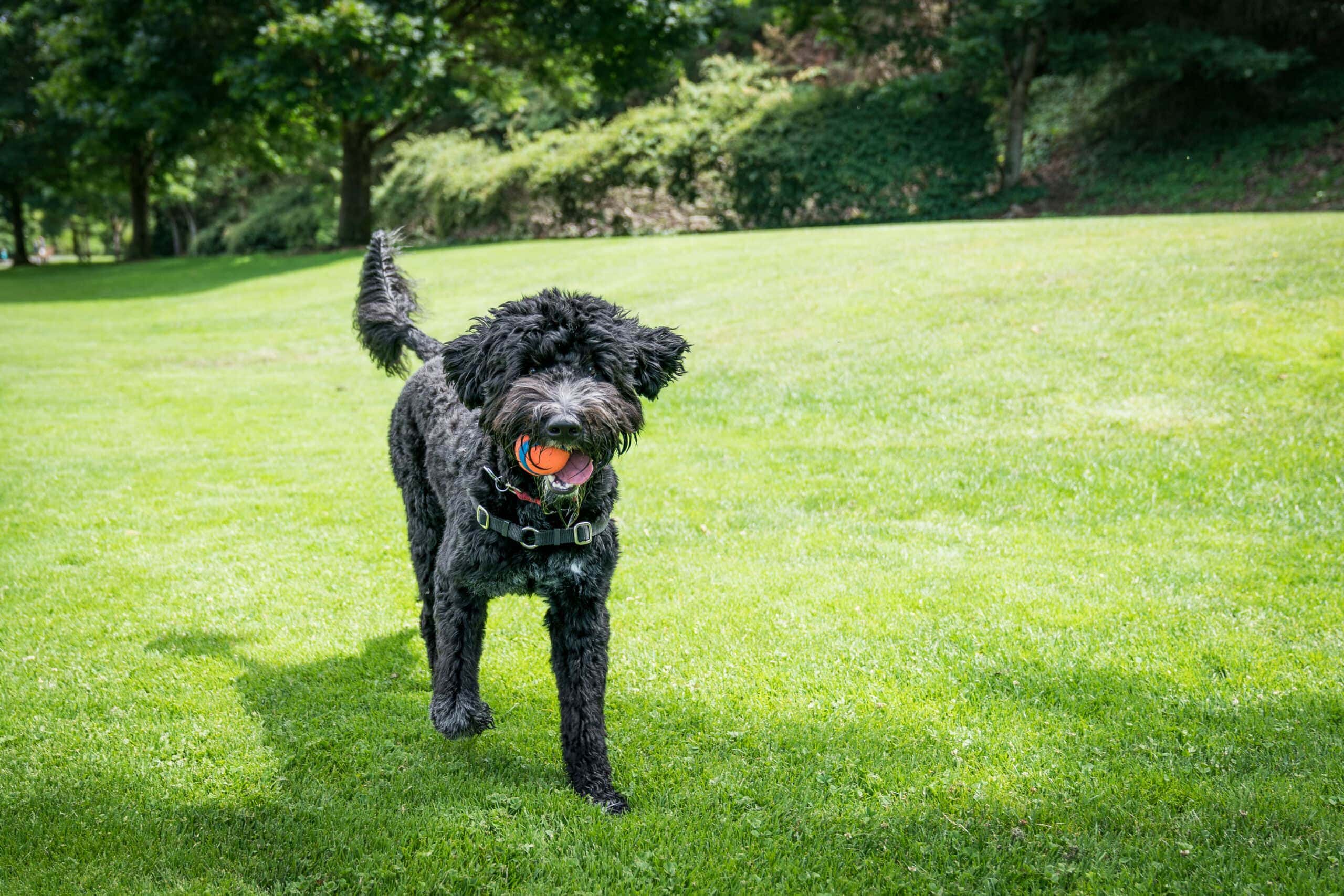Click to Skip Ahead
Dogs’ expected life spans vary greatly. While some have an estimated life span of as little as 5–8 years, others are expected to live for up to 15 years and even beyond in some cases.
The Portuguese Water Dog is one of the breeds with a fairly long estimated lifespan of 11-13 years and that generally enjoys good health, but this largely depends on the individual dog’s health status, genetics, and how well they’re cared for. Let’s dive in (pun very much intended) into the Portuguese Water Dog’s life expectancy and important factors to take into account.
What’s the Average Lifespan of a Portuguese Water Dog?
The average life expectancy of a Portuguese Water Dog is between 11 and 13 years, but some very lucky and healthy Portuguese Water Dogs live even longer than this. For comparison, here are the average lifespans of a few other popular dog breeds:
| Labrador Retriever: | 11–13 years |
| Golden Retriever: | 10–12 years |
| Poodle: | 10–18 years |
| German Shepherd: | 7–10 years |
| Dachshund: | 12–16 years |
Why Do Some Portuguese Water Dogs Live Longer Than Others?
A dog’s lifespan will depend on various factors that have an effect on overall health. Major factors include:

Nutrition
Proper nutrition is key to preventing health issues like obesity, which can lead to serious conditions like heart disease, diabetes, cancer, and joint degeneration. A complete and balanced diet from a reputable brand, coupled with enough exercise, can help to ensure your Portuguese Water Dog develops properly, stays in good shape, and feels well overall.
Environment and Conditions
Dogs living in cold, unsanitary, or otherwise unsafe conditions are more prone to becoming sick or getting injured or even killed due to health and safety oversights. For example, if a dog is allowed to roam freely in a poorly secured yard that gives out onto a road, they could very easily get into an accident.
The correct living environment for a dog is one that is secure, warm, dry, and comfortable. They should also be provided with plenty of affection and mental stimulation.
Size & Breed
Small breeds tend to live longer than large breeds, which might have something to do with the fact that large dogs grow and age more quickly and may be more susceptible to cancer-causing cells, as explained by evolutionary biologist Cornelia Kraus to the American Kennel Club1.

Genetics & Breeding History
Sometimes, a genetic (breed-specific) condition can affect a dog and affect their lifespan and/or overall quality of life. If a breeder is reputable, they will perform screenings to check for genetic health conditions.
Some of the health conditions that have been linked to Portuguese Water Dogs include progressive retinal atrophy, hip dysplasia, dilated cardiomyopathy, progressive rod-cone degeneration, Addison’s disease, and gangliosidosis.
The 4 Life Stages of a Portuguese Water Dog
1. Puppy
Dogs are considered puppies until they’re 6–9 months old. This is a crucial stage for socialization, as the younger dogs are, the more receptive they are to socialization and training.

2. Young Adult
Young adult dogs are from 6–9 months old up to 3–4 years of age. Your dog will become fully grown physically and should be fully socially mature by the end of this stage. They’ll likely still have plenty of energy as young adults.
3. Mature Adult
When a dog hits the start of the final 25% of their estimated lifespan (approximately 11–13 years for Portuguese Water Dogs), they’re in the mature adult stage. They may still be energetic but slow down a bit, though this depends on the dog—some remain puppy-like into adulthood and even into their senior years!

4. Senior
This period marks the final 25% of the dog’s average lifespan.
How to Tell Your Portuguese Water Dog’s Age
If you’ve adopted a Portuguese Water Dog and don’t know their age, you can ask your vet for an estimation. Factors that contribute towards an age estimation include the health and color of the teeth, color of the coat, energy levels, eye condition, and behavior. Let’s break this down further.
Younger dogs tend to have whiter teeth, but they often yellow with age. An older dog may also display dental wear and tear, staining, and tartar buildup, but this depends on how well the teeth have been cared for. Older dogs may also develop gray hairs (though this, too, can happen in younger dogs) and cloudiness in their eyes. They may also have lower energy levels.

Conclusion
In conclusion, the Portuguese Water Dog’s expected lifespan is pretty good—not as long as some breeds, like Poodles, for instance, but these figures are just estimations.
A healthy, happy Portuguese Water Dog with access to proper healthcare could live up to 15 and beyond. Don’t forget to take your dog for general vet checkups every 6–12 months to keep an eye on their health and get any health conditions diagnosed and treated as early as possible.
Featured Image Credit: Brook Robinson, Shutterstock










